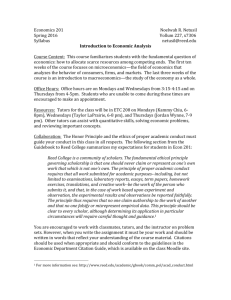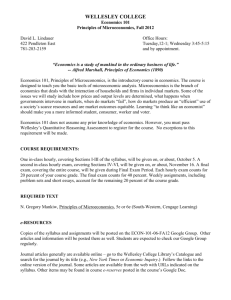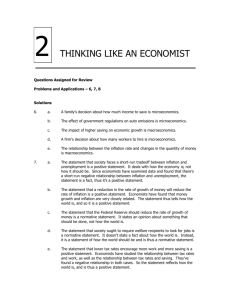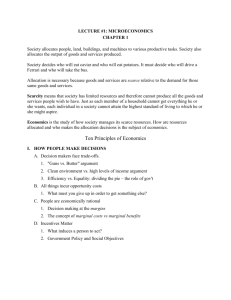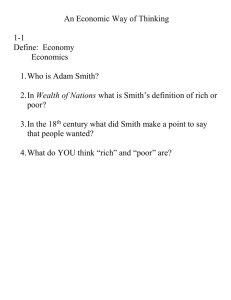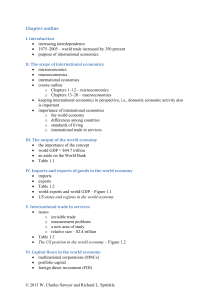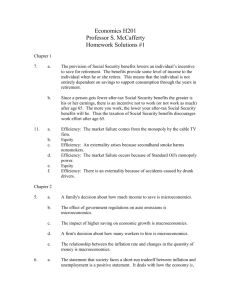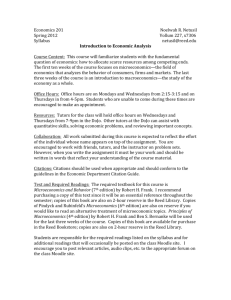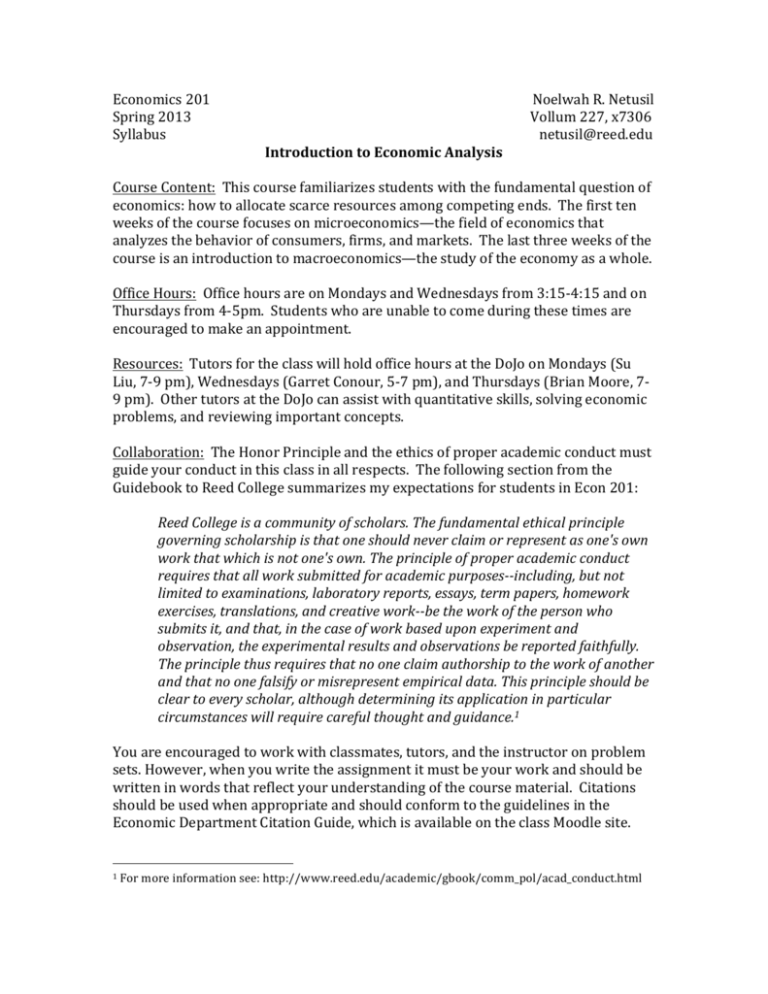
Economics 201 Spring 2013 Syllabus Noelwah R. Netusil Vollum 227, x7306 netusil@reed.edu Introduction to Economic Analysis Course Content: This course familiarizes students with the fundamental question of economics: how to allocate scarce resources among competing ends. The first ten weeks of the course focuses on microeconomics—the field of economics that analyzes the behavior of consumers, firms, and markets. The last three weeks of the course is an introduction to macroeconomics—the study of the economy as a whole. Office Hours: Office hours are on Mondays and Wednesdays from 3:15-­‐4:15 and on Thursdays from 4-­‐5pm. Students who are unable to come during these times are encouraged to make an appointment. Resources: Tutors for the class will hold office hours at the DoJo on Mondays (Su Liu, 7-­‐9 pm), Wednesdays (Garret Conour, 5-­‐7 pm), and Thursdays (Brian Moore, 7-­‐
9 pm). Other tutors at the DoJo can assist with quantitative skills, solving economic problems, and reviewing important concepts. Collaboration: The Honor Principle and the ethics of proper academic conduct must guide your conduct in this class in all respects. The following section from the Guidebook to Reed College summarizes my expectations for students in Econ 201: Reed College is a community of scholars. The fundamental ethical principle governing scholarship is that one should never claim or represent as one's own work that which is not one's own. The principle of proper academic conduct requires that all work submitted for academic purposes-­‐-­‐including, but not limited to examinations, laboratory reports, essays, term papers, homework exercises, translations, and creative work-­‐-­‐be the work of the person who submits it, and that, in the case of work based upon experiment and observation, the experimental results and observations be reported faithfully. The principle thus requires that no one claim authorship to the work of another and that no one falsify or misrepresent empirical data. This principle should be clear to every scholar, although determining its application in particular circumstances will require careful thought and guidance.1 You are encouraged to work with classmates, tutors, and the instructor on problem sets. However, when you write the assignment it must be your work and should be written in words that reflect your understanding of the course material. Citations should be used when appropriate and should conform to the guidelines in the Economic Department Citation Guide, which is available on the class Moodle site. 1 For more information see: http://www.reed.edu/academic/gbook/comm_pol/acad_conduct.html Text and Required Readings: The required textbook for this course is Microeconomics and Behavior (7th edition) by Robert H. Frank. I recommend purchasing a copy of this text since it will be an essential reference throughout the semester; copies of this book are also on 2-­‐hour reserve in the Reed Library. Copies of Pindyck and Rubinfeld’s Microeconomics (6th edition) are also on reserve if you would like to read an alternative treatment of microeconomic topics. Principles of Macroeconomics (6th edition) by N. Gregory Mankiw will be used for the last three weeks of the course. Copies of this book are available for purchase in the Reed Bookstore and are also on 2-­‐hour reserve in the Reed Library. Students are responsible for the required readings listed on the syllabus and for additional readings that will occasionally be posted on the class Moodle site. I encourage you to post relevant articles, audio clips, etc. to the appropriate forum on the class Moodle site. Reserve Materials: The following books are on two-­‐hour reserve Feenstra, Robert C. and Alan M. Taylor. 2008. International Trade New York, NY: Worth Publishers. Frank, Robert H. 2008. Microeconomics and Behavior (7th edition) Boston, MA: McGraw-­‐Hill Irwin. Mankiw, N. Gregory. 2012. Principles of Macroeconomics (6th edition) Mason, OH: South-­‐Western Cengage Learning. Pindyck, Robert S. and Daniel L. Rubinfeld. 2005. Microeconomics (6th edition) Upper Saddle River, NJ: Pearson Prentice Hall. Important Dates: Midterm Examinations: March 1 and April 12 Comprehensive Final Exam: to be set by Registrar’s Office There are five required problem sets for the course. Problem sets are due one week after they are distributed. Hard copies of all assignments are due at the start of class with late assignments penalized 1 letter grade for each day past the due date; assignments handed in more than 3 days after the due date will not be accepted. Please contact me as soon as possible if there are extenuating circumstances (illness, personal emergency) that justify an extension of a problem set deadline. Problem Set 1 2 3 4 5 Date Distributed Friday, February 8 Friday, February 15 Friday, March 8 Friday, March 29 Wednesday, April 24 2
Date Due Friday, February 15 Friday, February 22 Friday, March 15 Friday, April 5 Wednesday, May 1 Course Outline and Readings2 I.
Introduction to Microeconomics: January 28 Frank, Chapter 1 *Whaples, Robert. 2006. Do Economists Agree on Anything? Yes! The Economists’ Voice 3(9) Article 1. *Backhouse, Roger E. and Steven G. Medema. 2009. On the Definition of Economics Journal of Economic Perspectives 23 (1) 221-­‐233. II.
Demand, Supply and Market Equilibrium: January 30, February 1 & 4 Frank, Chapter 2 and Appendix Surowiecki, James. 2002. Fare Games The New Yorker (March 18). The Economist. 2004. Guessing Games (November 20). Joyce, Christopher. 2009. Scientists Help Ranchers Wrangle Carbon Emissions National Public Radio (December 10). III.
Consumer Behavior and Demand: February 6, 8, 11, 13 & 15 Frank, Chapters 3, 4 & 5 Glaeser, Edward L. 2005. Should the Government Rebuild New Orleans, Or Just Give Residents Checks? The Economists’ Voice 2 (4) Article 4. English, Ed. 2011. Tax and Nicotine. EconSouth (Second Quarter): 22-­‐26. *Waldfogel, Joel. 1993. The Deadweight Loss of Christmas The American Economic Review 83 (5) 1328-­‐1336. Kagel, John H., Raymond C. Battalio and Leonard Green. 1995. Economic Choice Theory: An Experimental Analysis of Animal Behavior. Cambridge University Press, Cambridge, UK. *Leibensten, H. 1950. Bandwagon, Snob, and Veblen Effects in the Theory of Consumers' Demand The Quarterly Journal of Economics 64 (2): 183-­‐207. IV.
Applications of Consumer Theory: February 18 & 20 Frank, Chapters 6 & 8 The Economist. 2009. New-­‐Year Irresolution (December 30) 55. The Economist. 2008. Carrot and StickK (February 7) 82-­‐83. *Akerlof, George A and Robert J. Shiller. 2009. Animal Spirits: How Human Psychology Drives the Economy, and Why it Matters for Global Capitalism. Princeton, NJ: Princeton University Press. *Kahneman, Daniel. 2003. A Psychological Perspective on Economics. American Economic Review 93(2): 162-­‐166. Readings marked with a * are optional. These are available in the stacks of the Reed Library or through article databases. 2
3
V.
Labor and Capital Markets: February 22, 25 & 27 Frank, Chapters 14 and 15 Blau, Francine D. and Lawrence M. Kahn. 2007. The Gender Pay Gap The Economists’ Voice 4 (4) Article 5. The Economist. 2012. Free Exchange: The Argument in the Floor (November 24): 82. * Barrow, Lisa and Cecilia Elena Rouse. 2005. Does College Still Pay? The Economists’ Voice 2(4) Article 3. *Blank, Rebecca M. 2011. Changing Inequality University of California Press, Berkeley, California. *Slemrod, Joel and Jon M. Bakija. 2008. Taxing Ourselves: A Citizen's Guide to the Debate Over Taxes MIT Press, Cambridge, Massachusetts. Midterm Examination #1: Friday, March 1st VI.
Production and Cost: March 4, 6 & 8 Frank, Chapters 9 and 10 Rich, Motoko. 2010. Math of Publishing Meets the E-­‐Book The New York Times (March 28). The Economist. 2012. Free Exchange: Land of the Corporate Giants (November 3). VII. Perfect Competition: March 11 & 13 Frank, Chapter 11 The Economist. 2009. Newspapers and Technology: Network Effects (December 17) VIII. Imperfect Competition: March 15, 25 & 27 Frank, Chapters 12 and 13 The Economist. 2009. Economics Focus: E Pluribus Tunum (October 24) 88. * Schmalensee, Richard. 1978. Entry Deterrence in the Ready-­‐to-­‐Eat Breakfast Cereal Industry The Bell Journal of Economics 9(2) 305-­‐327. IX.
General Equilibrium and Efficiency: March 29 Frank, Chapter 18W X.
Externalities: April 1 Pindyck and Rubenfeld, Microeconomics, Chapter 18 (pages 641-­‐665) Tomsho, Robert. 2010. Scraping Bottom, Some in Maine Look to Seaweed for Salvation The Wall Street Journal (January 4). *Abrams, Burton A. and George R. Parsons. 2009. Is CARS a Clunker? The Economists’ Voice 6 (8) Article 4. 4
*Burtraw, Dallas, Richard Sweeney and Margaret Walls. 2008. Crafting a Fair and Equitable Climate Policy: A Closer Look at the Options Resources (Fall) 20-­‐23. *Davis, Lucas W. 2008. The Effect of Driving Restrictions on Air Quality in Mexico City Journal of Political Economy 116 (1) 38-­‐81. *Dinan, Terry. 2012. Offsetting a Carbon Tax’s Costs on Low-­‐Income Households. Congressional Budget Office (Working Paper 2012-­‐16). *Leape, Jonathan. 2006. The London Congestion Charge Journal of Economic Perspectives 20(4) 157-­‐176. *Sovacool, Benjamin. 2008. Renewable Energy: Economically Sound, Politically Difficult. The Electricity Journal 21(5): 18-­‐29. XI.
Public Goods: April 3 & 5 Frank, Chapter 17 (pages 567-­‐582) Henrich, Joseph, Robert Boyd, Samuel Bowles, Colin Camerer, Ernst Fehr, Herbert Gintis, and Richard McElreath. 2001. In Search of Homo Economicus: Behavioral Experiments in 15 Small-­‐Scale Societies American Economic Review 91 (2) 73-­‐78. XII. Income Distribution and Poverty: April 8 Frank, Chapter 17 (pages 582-­‐591) Pew Center on the States. 2012. Data Visualizations: Economic Mobility of the States. The Pew Charitable Trusts. Pew Center on the States. 2011. Economic Mobility and the American Dream Where Do We Stand in the Wake of the Great Recession? The Pew Charitable Trusts. Dube, Arindrajit and Ethan Kaplan. 2012. Occupy Wall Street and the Political Economy of Inequality. The Economists Voice (March) 1-­‐7. * Blank, Rebecca. 2006. Was Welfare Reform Successful? The Economists' Voice 3(4). *Krugman, Paul. 2006. The Great Wealth Transfer. Rolling Stone Magazine (November). *The Economist special report (October 13, 2012): For Richer, For Poorer. XIII. International Trade: April 10 Feenstra and Taylor, International Trade, Chapter 1 Mankiw, Principles of Macroeconomics, Chapter 3 *Farrell, Diane. 2006. U.S. Offshoring: Small Steps to Make it a Win-­‐Win The Economists’ Voice 3(3). Midterm Examination #2: Friday, April 12th 5
XIV. Introduction to Macroeconomics: April 15 Mankiw, Chapters 10 and 11 Stiglitz, Joseph E. 2009. GDP Fetishism The Economists’ Voice 6 (8) Article 5. Revkin, Andrew C. 2005. A New Measure of Well-­‐Being From a Happy Little Kingdom The New York Times (October 4). XV.
Economic Growth: April 17 Mankiw, Chapter 12 The Economist. 2010. Worth a Hill of Soyabeans (January 7) Cox, Michael W. and Richard Alm. 2008. China and India: Two Paths to Economic Power Federal Reserve Bank of Dallas Economic Letter 3(8). The Economist. 2012. Green Growth: Shoots, Greens and Leaves (June 16): 68-­‐70. * The Brookings Institution. 2013. Fostering Growth Through Innovation (January 15). XVI. Unemployment: April 19 Mankiw, Chapter 15 Farber, Henry S. 2012. The Cost of Job Loss in the Great Recession: How Bad Has It Been? Economists Voice (January): 1-­‐5. Martinez-­‐Garcia, Enrique and Janet Koech. 2010. A Historical Look at the Labor Market During Recessions Economic Letter-­‐-­‐Insights from the Federal Reserve Bank of Dallas 5(1). Romer, Christina D. 2011. Jobless Rate Is Not the New Normal The New York Times (April 9). XVI. Money, Monetary Policy and Inflation: April 22 & 24 Mankiw, Chapters 16 and 17 Akerlof, George, William Dickens, and George Perry. 2000. Why a Little Inflation is Good. Milken Institute Review (4th quarter): 12-­‐18. Yellen, Janet L. 2012. Perspectives on Monetary Policy. Speech delivered at the Boston Economic Club Dinner, Boston, Massachusetts (July 23). * Radford, R.A. 1945. The Economic Organization of a P.O.W. Camp Economica 12 (48)189-­‐201. *Bernanke, Ben S. 2007. Microfinance in the United States. Speech delivered at the ACCION Texas Summit on Microfinance in the United States, San Antonio, Texas (November 6). 6
XVII. The Short Run-­‐-­‐Economic Fluctuations: April 26 Mankiw, Chapter 20 Bernanke, Ben. 2012. Some Reflections on the Crisis and the Policy Response. Speech delivered at the Russell Sage Foundation and The Century Foundation Conference on "Rethinking Finance," New York, New York (April 13). XVIII. Monetary and Fiscal Policy: April 29 & May 1 Mankiw, Chapters 21 and 22 The Economist. 2012. Free Exchange: No Short Cuts. (October 27) Stiglitz, Joseph. 2012. Stimulating the Economy in an Era of Deficit and Debt. The Economists Voice (March): 1-­‐6. * The Economists' Voice. 2012. What To Do About the Long Run Federal Budget Problems? (March). *Krugman, Paul. 1998. Baby-­‐Sitting the Economy Slate (August 14). *Fair, Ray. 1996. Econometrics and Presidential Elections. Journal of Economic Perspectives 10 (3): 89-­‐102. XIX. Concluding Thoughts: May 3 Mankiw, Chapter 23 The Economist. 2012. The Next Crisis: Sponging Boomers (September 29): 75-­‐76. Krugman, Paul. 2009. How Did Economists Get It So Wrong? The New York Times (September 2). 7

